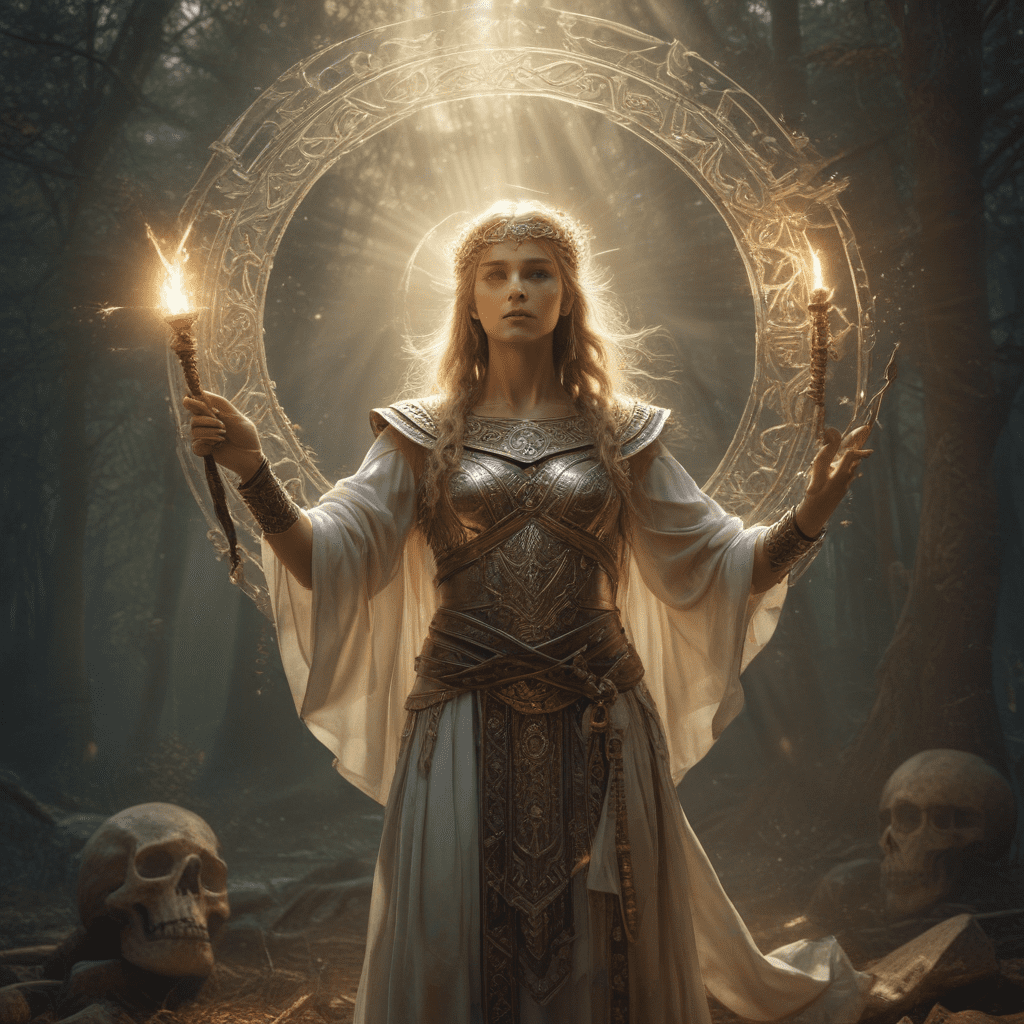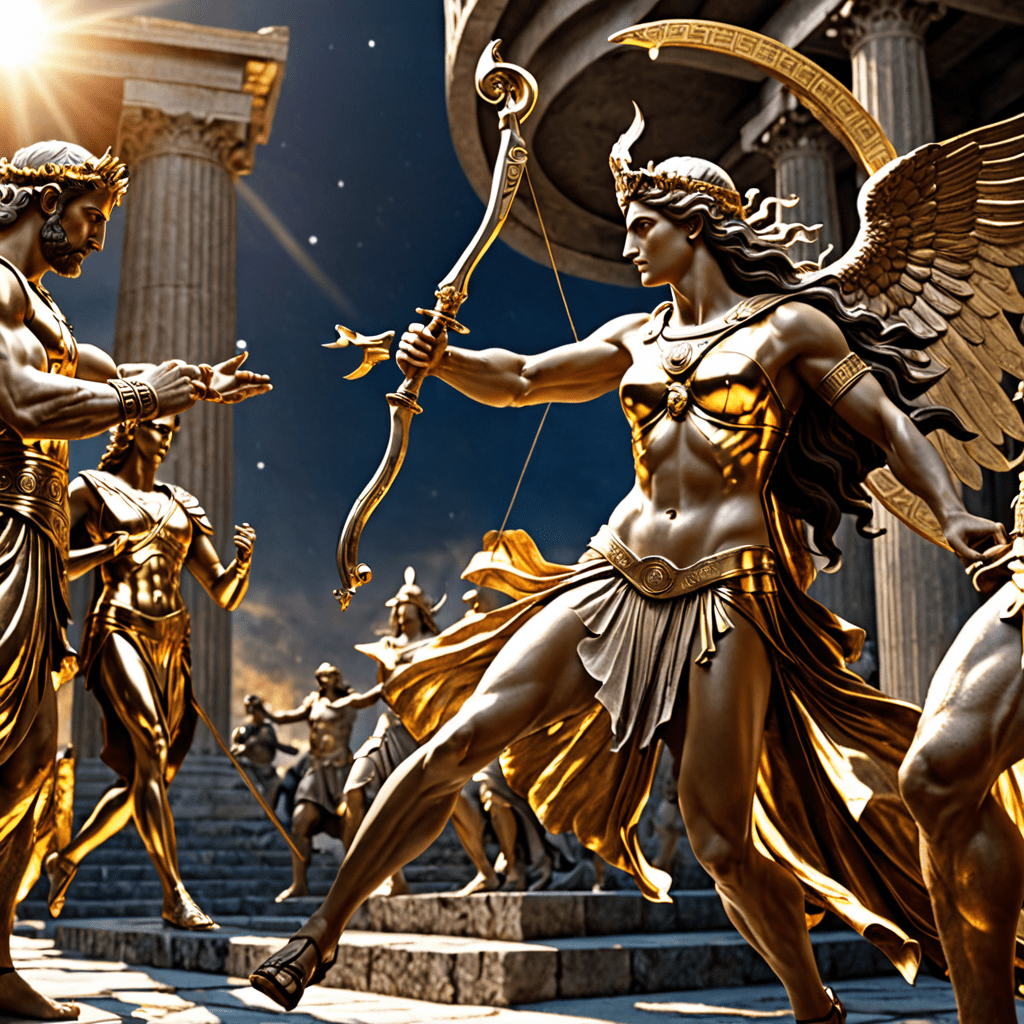1. The Slavic Pantheon and the Cosmic Order
The Slavic pantheon is a complex and multifaceted system of beliefs and deities that governed the lives of the ancient Slavs. At the heart of this pantheon was the concept of the cosmic order, a delicate balance between the forces of light and darkness, good and evil. This cosmic order was maintained by a pantheon of gods and goddesses, each with their own unique powers and responsibilities.
2. Slavic Gods and Goddesses Associated with Light
Among the most important Slavic gods and goddesses associated with light is Dazhbog, the sun god. Dazhbog was worshipped as the bringer of light, warmth, and fertility. He was believed to ride across the sky in a golden chariot, bringing sunlight and warmth to the earth. Other Slavic deities associated with light include Svarožič, the god of fire, and Perun, the god of thunder and lightning.
3. The Sun as a Symbol of Life and Fertility
The sun was a central symbol of life and fertility in Slavic mythology. The sun's rays were believed to bring warmth, light, and growth to the earth. The sun was also associated with the cycle of life, death, and rebirth. The rising sun was seen as a symbol of new beginnings, while the setting sun was seen as a symbol of the end of life.
4. The Moon as a Symbol of Night and Mysteries
The moon was another important symbol in Slavic mythology. The moon was associated with the night, darkness, and mysteries. It was believed that the moon had a great influence on the tides, the weather, and the growth of plants. The moon was also associated with the cycle of life, death, and rebirth. The new moon was seen as a symbol of new beginnings, while the full moon was seen as a symbol of completion.
5. Fire as a Symbol of Purity and Renewal
Fire was a sacred element in Slavic mythology. It was believed that fire had the power to purify and renew. Fire was used in a variety of rituals and ceremonies, including the celebration of the summer solstice. The summer solstice was a time when the sun was at its peak and the days were at their longest. The Slavs believed that the summer solstice was a time of great power and renewal.
6. Lightning as a Symbol of Divine Power and Justice
Lightning was a powerful force in Slavic mythology. It was believed to be a manifestation of the gods' power and justice. Lightning was often used to punish those who broke the cosmic order. It was also believed that lightning could purify and renew the earth.
7. The Northern Lights as a Symbol of Cosmic Balance
The Northern Lights, or Aurora Borealis, were a mysterious and beautiful sight for the ancient Slavs. They were believed to be a symbol of the cosmic balance between light and darkness, good and evil. The Northern Lights were also thought to bring good luck and fortune to those who saw them.
8. The Symbolism of Sunlight in Slavic Folklore
Sunlight was a powerful symbol in Slavic folklore. It was believed that sunlight had the power to heal, protect, and purify. Sunlight was also associated with good health, happiness, and prosperity. The ancient Slavs often used sunlight in their rituals and ceremonies.
9. The Role of Light in Slavic Rituals and Ceremonies
Light played an important role in Slavic rituals and ceremonies. The ancient Slavs used light to celebrate the solstices, the equinoxes, and other important events. Light was also used to purify and protect the home from evil spirits. The Slavs believed that light had the power to bring good luck and fortune to those who respected it.
10. The Legacy of Light Symbolism in Slavic Culture
The symbolism of light continues to play an important role in Slavic culture today. Many traditional Slavic holidays and festivals incorporate light into their celebrations. Light is also used in a variety of Slavic folk art and crafts. The symbolism of light is a reminder of the importance of the cosmic order and the power of nature.
FAQ
Q: What is the cosmic order?
A: The cosmic order is the delicate balance between the forces of light and darkness, good and evil. The cosmic order was maintained by a pantheon of gods and goddesses.
Q: What is Dazhbog?
A: Dazhbog is the Slavic sun god. He was worshipped as the bringer of light, warmth, and fertility.
Q: What is the significance of fire in Slavic mythology?
A: Fire was a sacred element in Slavic mythology. It was believed that fire had the power to purify and renew. Fire was used in a variety of rituals and ceremonies.
Q: What do the Northern Lights symbolize in Slavic mythology?
A: The Northern Lights, or Aurora Borealis, were believed to be a symbol of the cosmic balance between light and darkness, good and evil. The Northern Lights were also thought to bring good luck and fortune to those who saw them.
Q: How is light used in Slavic rituals and ceremonies?
A: Light played an important role in Slavic rituals and ceremonies. The ancient Slavs used light to celebrate the solstices, the equinoxes, and other important events. Light was also used to purify and protect the home from evil spirits.



